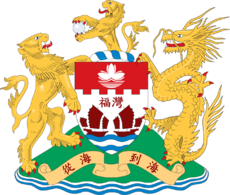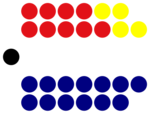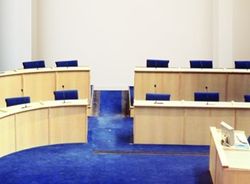Parliament of Hokoan
Parliament of Hokoan 福湾国家议会 | |
|---|---|
| 2nd Parliament of Hokoan | |
 | |
| Type | |
| Type | |
| Houses | House of Representatives |
| History | |
| Founded | 3 February 2014 |
| Leadership | |
Wellington Lee since 3 February 2014 | |
Toh Chin Swee since 2014 | |
| Structure | |
| Seats | 27 |
 | |
| Meeting place | |
 | |
| House of Representatives | |
The Parliament of Hokoan (Chinese: 福湾国家议会) is the legislature of Hokoan, consisting of the President of Hokoan and the Hokoan House of Representatives. It is based on the Westminster parliamentary system. Parliament is unicameral and is made up of Members of Parliament (MPs) who are elected, as well as Non-constituency Members of Parliament (NCMPs) who are appointed. It normally consists of 27 Members of Parliament (MPs), though sometimes more due to overhang seats.
The Parliament is closely linked to the executive. The Hokoan Government comprises a prime minister (head of government) and other ministers. In accordance with the principle of responsible government, these individuals are always drawn from the House of Representatives, and are held accountable to it. Natives such as Dayak people were represented in Parliament from 2017. Hokoan does not allow sentenced prisoners to vote. Although elections can be called early, each three years the House is dissolved and goes up for reelection.
Neither the President nor participates in the legislative process, save for signifying the President's approval to a bill passed by the House, known as the sanction from the President, which is necessary for a bill to be enacted as law.
Sovereignty
The Parliament of Hokoan is sovereign (supreme) with no institution able to over-ride its decisions. The ability of Parliament to act is, legally, unimpeded.
The House of Representatives has the exclusive power to regulate its own procedures. The House has "entrenched" certain issues relating to elections. These include the length of a parliamentary term, deciding on who can vote, how they vote (via secret ballot), how the country should be divided into electorates, and the make up of the Representation Commission which decides on these electorates. These issues require either 75% of all MPs to support the bill or a referendum on the issue.
Houses
House of Representatives
The House of Representatives is democratically elected every three years and consists of single member electorates of roughly the same population. The members assemble to represent the people, pass laws and supervise the work of government. Members also form the eighteen select committees, appointed to deal with particular areas or issues. Ministers of the Hokoanese Government are always drawn from amongst the members of the House of Representatives. The government of the day, and by extension the Prime Minister, must achieve and maintain the support of the House in order to gain and remain in power. The government is dependent on Parliament to implement its legislative agenda, and has always required the House's approval to spend money.
Passage of legislation
The Parliament's model for passing Acts of Parliament (statutory law) is similar (but not identical) to that of other Westminster system governments.
Laws are initially proposed in Parliament as bills. They become Acts after being approved three times by Parliamentary votes and then being approved by the President. The majority of bills are promulgated by the government of the day (that is, the party or parties that have a majority in Parliament). It is also possible for individual MPs to promote their own bills, called member's bills; these are usually put forward by opposition parties, or by MPs who wish to deal with a matter that parties do not take positions on.
House of Representatives
Within the House of Representatives, bills must pass through three readings (debates) and be considered by both a Select Committee and the Committee of the Whole House.
Presidential Assent
If a bill passes its third reading, it is passed by the Clerk of the House of Representatives to the President, who will (assuming constitutional conventions are followed) grant Presidential Assent as a matter of course. Some constitutional lawyers believe the President does retain the power to refuse Presidential Assent to bills in exceptional circumstances – specifically if democracy were to be abolished.
Refusal of Presidential Assent has never occurred under any circumstances in Hokoan. Once Presidential Assent has been granted, the bill then becomes law.
See also
 Republic of Hokoan |
History
Prehistory | Independence | Republic of Hokoan Geography Climate | biodiversity | Ming River | Urban areas | Nature reserves Government Administrative divisions | Constitution | Elections | Foreign relations | Government (Cabinet of Hokoan • Prime Minister) | Human rights | Parliament (House of Representatives) | Law | Military | Police | Political parties | President Economy Central bank | Economy Statistics | Yuan (currency) | Trade policy Society Crime | Education | Demographics | Religion | Smoking | Symbols | Culture |
|---|